All Courses
Course Descriptions
Sessions College offers an exciting range of online design courses. Ask an Admissions Advisor about tuition and start dates--and taking a course as part of a degree or certificate program.
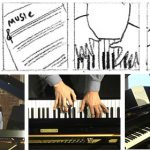 Digital Video Production
Digital Video Production
Learn to produce, shoot, and edit digital video
Can you hear Sundance calling? In this online video production course, you'll learn the basics of planning and shooting videos. You'll learn how to control your video camera, execute different kinds of shots, and maintain continuity in your projects. Working with an expert instructor, you'll gain experience in shooting different kinds of videos, focusing on storytelling, production planning, and sound editing, with the ultimate goal of telling stories that move audiences. This course will empower you with the knowledge to tell compelling stories for news, corporate video, and social media.
 Drawing I
Drawing I
Learn to draw and communicate what you see
Many people are afraid to draw, but the truth is that drawing is not as hard as it seems. If you can relax, get your mind around the task, and begin to understand what you see, you can draw. In this online drawing course, you'll learn how to analyze what you see in the world around you and communicate it on paper. Guided by a professional artist, you will explore the critical concepts of line, mass, form, perspective, value, and composition, building a solid foundation for all your art and design work.
 English Composition
English Composition
Develop confidence and fluency in your writing
Writing is an essential skill in almost any professional career you can name. In this online english composition course, students learn to become better readers and writers. Your goal is to produce clearer, more active sentences, better structured paragraphs, and more coherent and interesting personal and analytical essays. Throughout the semester, class discussions will use the critique of images and videos on art as a stimulus for writing. Students will develop two polished essays that will be presented for peer critique.
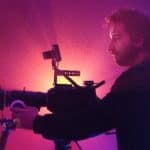
Expanding your cinematic point of view
What makes the cinematography of the great filmmakers so compelling? In this course, you will develop an understanding of foundational cinematic principles, including shot types, composition, and lighting, and explore how to apply them in a series of creative projects. The course culminates in a final project demonstrating your ability to plan and execute a visually compelling scene in which actions speak louder than words.
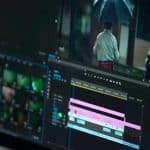
Make Editing Your Superpower
As a film or video editor you are storyteller with the power to affect your viewer in ways you may not even imagine. In this course, you'll study the tools and techniques used by professional editors, learning the basics of how to manage projects in Premiere as you explore how editing affects the pacing and mood of a scene. Lectures on montage, coverage, and B-roll explore how creative editors make the connections between each shot that pull a scene together. In final project, students demonstrate the ability to edit a set of footage in two distinct moods.

Storytelling for Film and Digital Media
Do you have what it takes to write for the screen? In this class, you will analyze and write screenplays, developing your ability to work with dialogue, character development, and plot structure. During the class you will learn how to interpret and correctly format a script. By the end of the class, you will have created a compelling short dialogue scene between two or more characters.
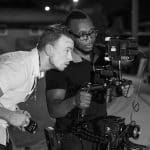
Develop your directorial vision
What does it mean to direct a movie? Directing has been compared to many things, ranging from leading an army into battle to managing a corporation. In this course, you'll gain hands-on experience of many aspects of directing including interpreting a script, using camera movement, sound design, and working with actors. Throughout the course, there is a focus on what makes a director's work distinctive and how you begin to develop those qualities in your work. In the final project, you will test your ability to creatively interpret a script for the screen in your own unique style.

Explore projects in digital and social media
This multi-faceted course will enhance your filmmaking and digital media skills with an emphasis on planning, producing, and distributing creative work through web-based applications and venues such as YouTube, Instagram, TikTok, and Twitch (livestreaming). You will research, conceive, plan (using storyboards and other planning aids), and produce a variety of creative pieces by applying filmmaking principles such as storytelling, cinematography, directing, and editing to short-form digital media projects to distribute and stream through multiple web-based venues and channels.

Leverage your power with words to create compelling stories
In this class you will learn the fundamentals of screenwriting, developing the ability to write effective scenes and communicate the essence of a story in your writing. Throughout the course, you will learn the basics step by step, by analyzing award-winning movie scenes and evaluating how a writer can communicate the unique voice or state of mind of character and create interesting character interactions. Students will utilize a professional script-writing program, learning how to implement correct screenplay formatting, avoid common pitfalls, and pay careful attention to structure, spelling, and grammar. By the end of the course you will have developed a script for a dramatic short film scene.

Discover the secret sauce of great films
To make great films, you need to understand what makes them tick—how they are put together. And the best, most transformational way to do that is to closely study some of the greatest movies ever made. In this class, you will learn and apply concepts and principles for the critical analysis of films. You will explore six classic and contemporary films in great depth, engaging in focused discussions of specific scenes, and writing critical analyses that demonstrate your understanding and appreciation of the elements of filmmaking. Through critical analysis you will learn how to look and write about films, gaining insights that will enrich your future filmmaking.
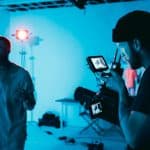
From Rough Cut to Final Cut
In this course, you'll produce a complete short narrative or documentary film from concept to screening. Guided by your instructor, students will script, shoot, and edit a short narrative or documentary film. In the first half of the course, students will complete all aspects of pre-production: scripting, planning, recruiting, and more. In the second half, students will shoot and edit their film, refining their project into a polished production, having gained insights from multiples rounds of feedback, informed by course content, inspiration, and your lived experience.
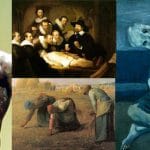 GEN 106: History of Art
GEN 106: History of Art
Build a conceptual framework for understanding art
What essentials do artists and designers just need to know? In this online art history course, you'll build a foundation in art and the artists who created it. You'll explore profound themes that have concerned artists for centuries: nature, the human body, society, religion, and politics. Through engaging lectures and projects, you'll learn how to identify the mediums, materials, and techniques artists use and discuss the styles of important artists, art movements, and historical periods from antiquity through the mid-20th century.
 GEN 204: Intro to Marketing
GEN 204: Intro to Marketing
Gain a Practical Introduction to Marketing
Today's business clients are looking for designers who can apply their creative talents in ways that enhance strategic business goals. In this online introductory Marketing Design course, you'll learn tried-and-true marketing concepts and explore how they affect the design process. You'll gain a solid grasp of the marketing process, understand key terms and concepts that every marketer uses, and pick up smart questions to ask in client meetings.
 GEN 206: Creative Business
GEN 206: Creative Business
Get ready for a creative career
The course provides essential preparation for finding employment opportunities in your creative industry. You will learn how to define a personal career path, break down the job market, and define their goals, talents, and ideal job. This course explores different ways to brand yourself as a professional creative, discussing tips for resume and portfolio preparation, self-promotion, marketing, client searches, responding to leads, interviewing, and presenting work and/or campaigns.

Learn the financial fundamentals that artists and designers need to know
Any creative who wants to establish a freelance career or succeed in business will benefit from a basic understanding of accounting. This course includes a focus on basic accounting principles and how they can be applied within the context of a small creative business. You will explore and identify how to use Generally Accepted Accounting Principles (GAAP), ledgers and journals, and how to follow and apply accounting strategies and cycles when running a creative focused business. Additionally, this course provides an introduction to balance sheets, financial statements, assets and liabilities, and equity, as well as an exploration of business ethics.
 GEN 402: Communication
GEN 402: Communication
Explore the application of communication theory
Engage in the process of examining, analyzing, summarizing, and evaluating communication strategies and theories. Students will demonstrate how to apply various communication principles through speech, including the consideration of the communication process, receiver perceptions, and verbal and nonverbal communication, as well as listening. The theory of communication will be explored in regard to engaging small groups, the public, and a variety of organizational contexts. A broad range of communication venues and considerations will be evaluated including interviewing, mass media, the use of new technologies, the influence of relationships, body language, intercultural perspectives and gender, as well as how to address conflict and negotiations.
 GEN 409: Cultural Anthropology
GEN 409: Cultural Anthropology
Develop a deeper understanding of how culture works
As a creative professional, you will communicate ideas to complex and diverse audiences. This course explores multiple theories of cultural anthropology that inform the way we understand identities and societies. Areas of focus include language and communication, economic and political systems, ethnocentrism and culture, kinship and descent, marriage and family, gender and sexuality, race and ethnicity, religion and belief systems, the effects of colonialism and industrialization, and the impact of globalization on culture.
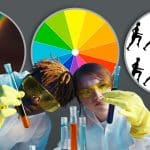
Explore the scientific basis of visual perception
Any creative professional—artist, designer, or photographer—creates artwork, images, or animations in a natural world that is governed by the laws of physics. In this introductory science class, students will explore and apply scientific principles that are fundamental to visual perception. Students will learn the scientific basis of key concepts in light, color, and motion, explore research methods to discover how they work, and express this scientific knowledge in their creative work. Students will graduate the course with a solid understanding of how scientific theories, research, and experimental methodology are applied, building a foundation for future learning.
 General Psychology
General Psychology
Root your creative choices in an understanding of human behavior
An understanding of human psychology is essential for any designer. In this online psychology course, you'll build a foundation in theories of the mind. The course focuses on the biological and environmental bases for human behavior, including motivation, emotions, states of consciousness, learning, and personality. Students examine classic theories and theorists in psychology and complete research- and reflection-based projects.
 Graphic Design Capstone & Portfolio Review
Graphic Design Capstone & Portfolio Review
A portfolio project and portfolio review for Graphic Design majors
The Graphic Design Capstone and Portfolio Review class offers an opportunity to develop a multifaceted portfolio piece and hone your creative work into a polished presentation for future clients and employers. The Graphic Design Capstone Project provides a simulation of an extended client design project. Students will take a project from concept to final presentation. Students work closely with the department head, interpreting a project brief, developing design elements, and designing a logo, brochure, and package design. Students participate in Portfolio Review in weeks 9-15 of the semester. This provides students the opportunity to gather and develop a portfolio of work and present it to faculty and classmates for feedback.